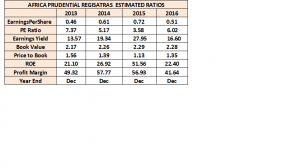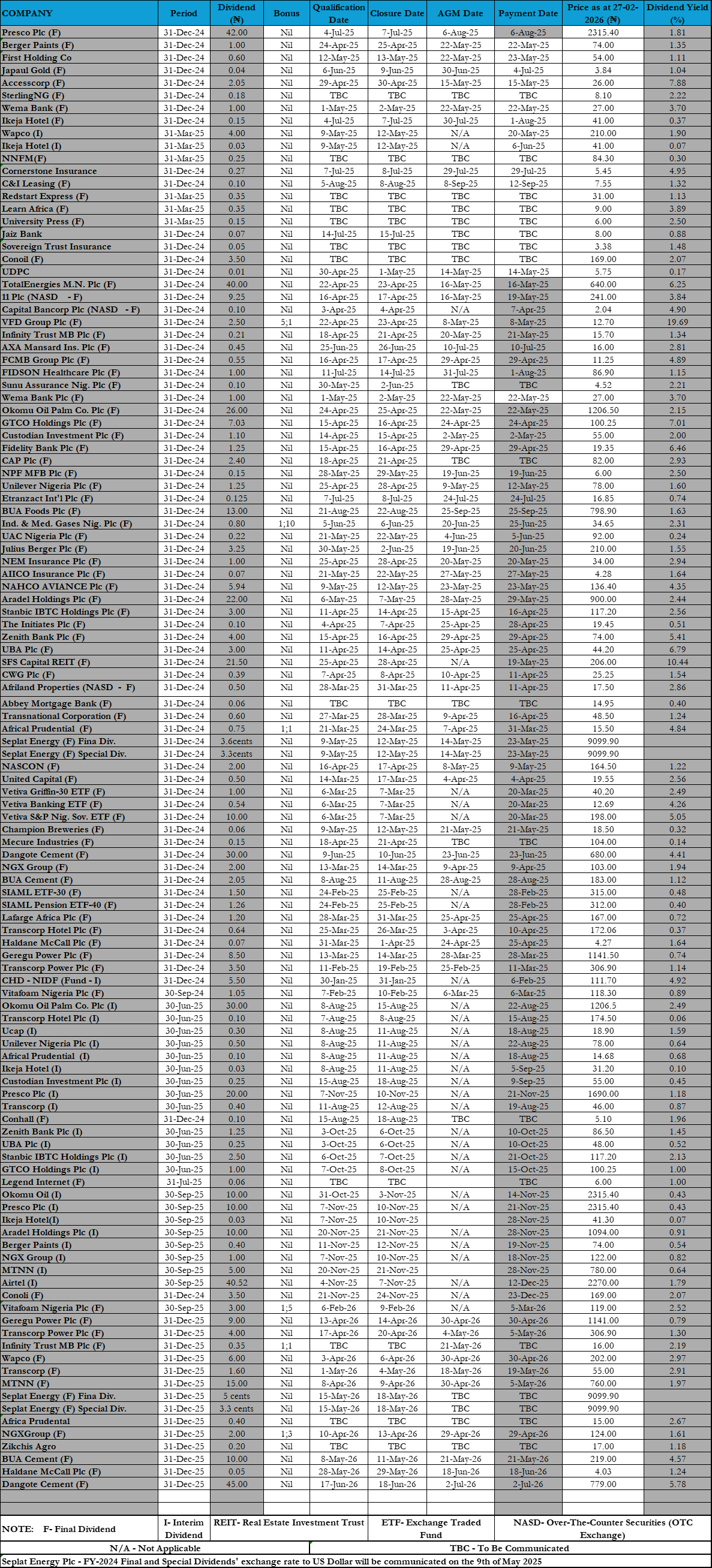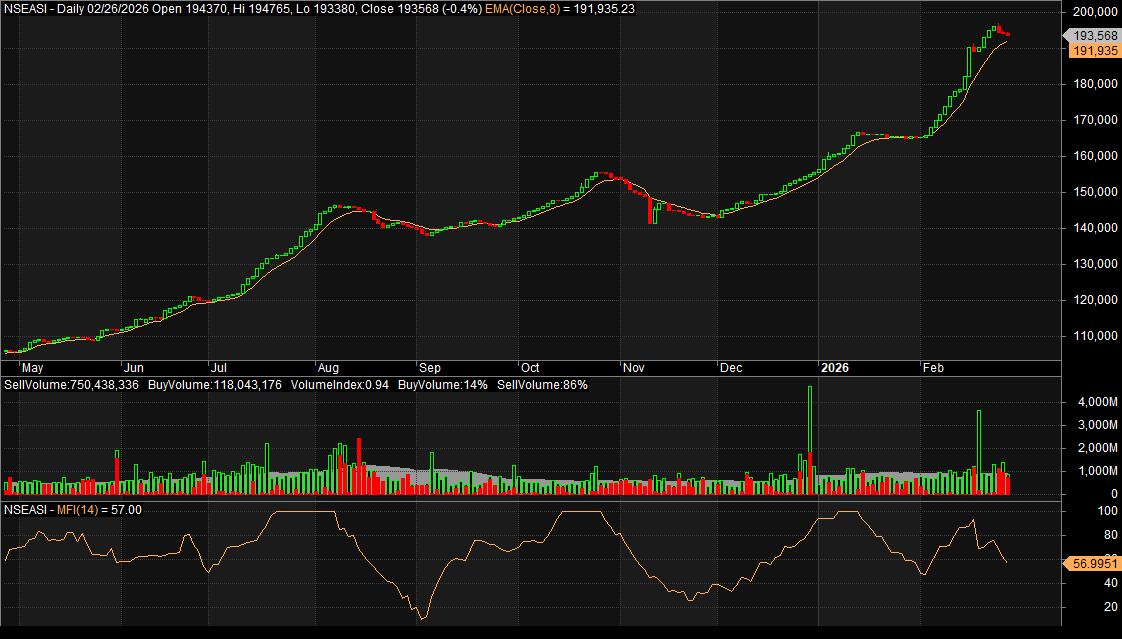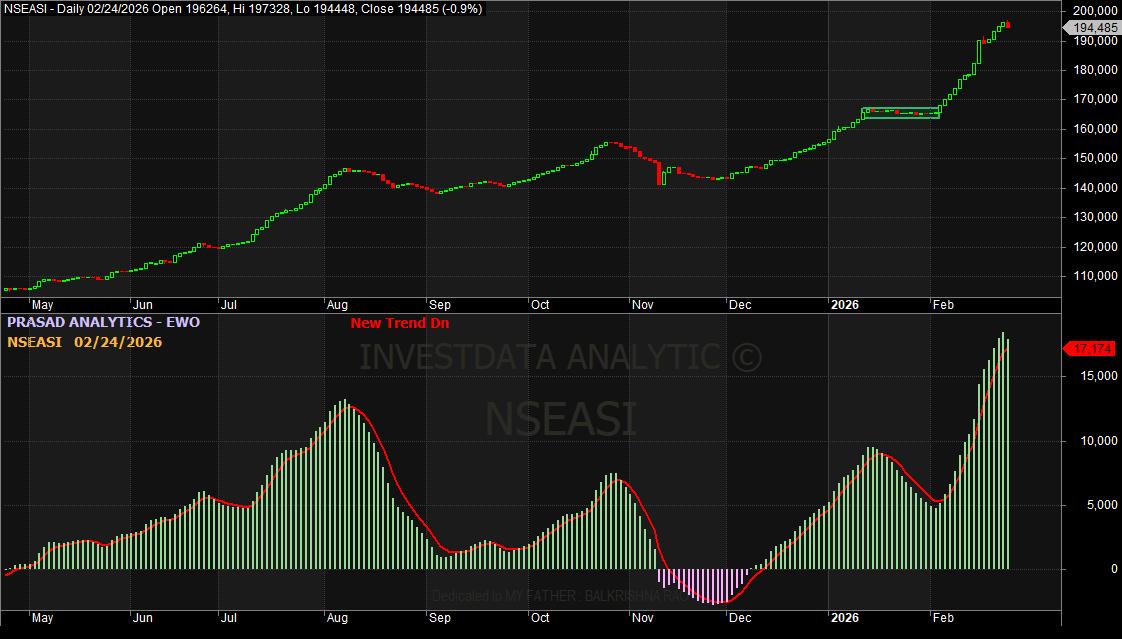
The management of Africa Prudential recently released its full-year earnings report for 2016 and the numbers were a departure from what the company posted in 2015 as its top and bottom lines were down, resulting in a 50% dividend cut that has expectedly started influencing its share price negatively.
The mandatory e-dividend, IT driven share registration service and unstable financial market have affected its fee income and investment drive as reflected in 2016 gross earnings. The huge goodwill impairment provision for acquiring software, in addition to payment of high deferred tax charge, compared to that of previous year have equally eaten into the company profit. The company’s five-year strategic rolling plan and projection since becoming listed in 2013 seem to have slowed down in 2016 as numbers were below estimates as it paid the lowest dividend of 30 kobo in four years.
The company’s scored card showed a 5% decline in gross earnings to N2.45bn, from N2.54bn in 2015, attributable to its weak investments and fee income earnings from the core service of share registration and investment in equity and fixed securities. Other income dropped to N29.21m from N30.98m in 2015. The huge impairment charges or losses during the year that led to the provision of N147.46m from N52.87m in 2015, just as there was the high tax expenses of N426.76m against N181.42m in 2015, this was as a result of deferred tax. This situation impacted on its profit after tax, which decreased to N1.02bn from N1.45bn in 2015, representing a 40% drop.
The low quarterly earnings of the company for the year consolidated to a low full-year earnings power and dividend of 30 kobo for 2016. The stock is currently selling at N2.88 per share, which is above its Book Value. The company’s Book Value currently stands at N2.28 and Price/Eearnings ratio is 6.02x. Investors’ waiting period has therefore increased, as a result of weak earnings of the company.
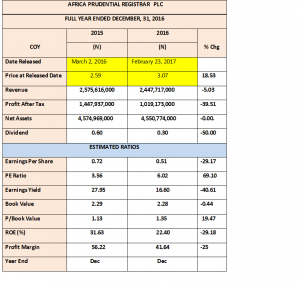
Source: NSE, Company Report & Investdata Research
Valuation/Recommendations
The company’s under-performance as revealed by the numbers posted shows that the ongoing economic situation and unstable financial markets have not helped. The 2016 numbers is therefore an indication where the company is heading in 2017 if financial markets remained unstable, while economic recovery is still long in coming. Its Book Value at N2.28 and profit margin of 41.64% which is among the highest in the market, but signifies that the stock is selling at a premium. Meanwhile, the market value on the strength of its Price-Earnings-Ratio of 6.02x, which is relatively okay in the market.
The company has consistently paid a dividend since 2013, but its 2016 payout was down by 50% to 30 kobo from 60 kobo in 2015. Based on reality in the market and economic climate , we advise investors in the stock to HOLD and watch it, as well as the market trend.
History
Africa Prudential Registrars Plc was listed on the exchange in 2013 to provide share registration service. The company is a technology–driven Capital Market Investment Mediator (CMIM). It was fully owned by United Bank for Africa Plc before being quoted on the NSE, thereby becoming a publicly owned company with many shareholders. Its standard-delivery service for corporate organisations in the primary and secondary sectors of the capital market has always been its strong performance.
Its 31 years of share registration experience in the Nigerian Capital Market has afforded the company opportunities to participate in various offers, including Initial Public Offerings, Right Issues, Debentures, as well as corporate and government bonds
Management
At any given time the easiest way to assess any company’s management is the earnings reports, whether quarterly or full year. The commitment, competence and ability to strategically reposition its products or services to drive profitability of Africa Prudential’s management remains intact, despite the latest performance which points to the need to encourage the management to reverse this position and support its share price.
The management team should be even more proactive in capturing more market share and building its top and bottom lines to create and grow value for all its stakeholders.
Performance Analysis
Critically x-raying the company performance in the last four years since it became listed on the Nigerian stock exchange, shows an uptrend in performance, but with the slowdown in 2016, it is obvious that the business environment remains challenging but the company has struggled through to continually post positive numbers that has supported payment of dividend in the period under review.
The company’s four –year financials reveals that the management had surpassed its forecast and projection three years before slowing down in 2016 financial year.
Within the period, for example, the company has consistent grown gross earnings and other performance indices, with gross earnings income for the period rising by 32.45% to N2.45bn from just N1.85bn in 2013.
Profitability rose marginal for the period, up from N914.46 million in 2013 to N1.02 billion, a difference of 11.45%, after hitting a high of N1.45bn in 2015 on a steady growth from 2013. This supports commitment of management to grow earnings and manage cost as reflected in its profit margin for the review period that had been above all standard internationally and within.
Net asset on the other hand, currently stands at N4.55bn from N4.33bn in 2013 revealing an uptrend for three years before the slight drop in 2016. The company’s dividend payment is a function of its improved earnings for the period, bringing a total dividend payout of N1.60 which is above the company listing price in 2013. Investors that position in the stock since then have recouped their investment just through dividend alone, not looking at the capital growth for same period.
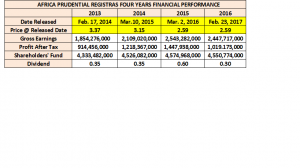
SOURCES: COMPANY DATA & INVESTDATA RESEARCH
Estimated Performance Ratios
The company’s performance ratio for the period under review showed a mixed direction as the amount earned by investors and management were higher at 51 kobo from 46 kobo in 2013 and lower from 72 kobo in 2015 which is the highest for the period. This is a reflection of the strong earning power of the company in an unstable risk business environment but weaken in 2016.
Its price earnings ratio remains fair and good at the current estimate of 6.02x from a high of 7.37x in 2013. The last full year EPS is a yield of just 16.6% of the market price as of the release date after recording a steady earnings yield growth from 13.57% in 2013 to the highest in 2015 at 27.95%, with the recent Dividend Yield of 9.77% as at the price on released. The Book Value for same period were in the ranges of N2.17, N2.26, N2.28 and high of N2.29 in 2015. Putting this ratio and the market price of the stock side-by-side, signals opportunity for medium and long term investors. The profit margin of the company over the years have improved as management effectively controlled cost to boost profit despite that it was decline in 2016.
